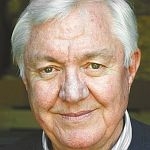
The new, inexperienced North Korean leader Kim Jong-un’s threats to use
nuclear weapons against the American homeland can hardly be brushed
aside as the same old North Korean bellicose rhetoric. Yet at the same
time, I see no signs that the national security apparatus of the U.S.
government is in full crisis mode.
There is a long history of
North Korea making belligerent threats to annihilate South Korea along
with the approximately 28,000 American troops still stationed there.
Over the years, the three generations of the Kim dynasty have continued
to blame the "enemy" in Washington for the abject failure of North
Korea’s own political and economic system. They’ve often resorted to
murder and extortion. Just three years ago, the North Koreans torpedoed a
South Korean naval vessel which went down with 46 sailors aboard.
Yet
there is a tangible difference between past such incidents and what is
happening today – namely – North Korea now has nuclear weapons. Last
month, James Clapper, the Director of National Intelligence, presented a
report to the Senate Intelligence Committee which concluded that North
Korea’s nuclear weapons and missile programs pose a "serious threat" to
the U.S. and its allies in Asia.
We know that the Kim regime
fired a long range rocket in December and two months later detonated
underground what it called a "smaller and lighter" nuclear device. But
there is no evidence in the public domain that the North Koreans
actually have been able to "weaponize" their nuclear device. To do that
they would have to make a nuclear warhead small enough and sufficiently
sophisticated to be mounted onto one of their long range missiles. If
they had achieved that capability, the alarm bells in Washington would
almost certainly be a lot louder than they are at the present.
The
U.S. did beef up its presence in annual Korean military exercises with
two nuclear capable B-2 stealth bombers and other high-tech planes and
ships. Yet in recent days the White House has appeared to be trying to
ease the growing tensions. Jay Carney, the White House press secretary
said on Monday, "We are not seeing changes in the North Korean military
posture such as large scale mobilizations," He described this is a
"disconnect" between North Korea’s rhetoric and its actions.
The
Kim regime responded by announcing it was going to restart what was
once its main nuclear reactor, which might eventually increase its
nuclear weapons stockpile. And Wednesday it blocked South Korean workers
from entering a huge industrial zone which is the last remaining symbol
of inter-Korean cooperation – and a crucial money-maker for the North.
North
Korea is the last remaining Stalinist country standing. It is erratic
and treacherous. But in the dangerous world of nuclear politics, it
cannot be ignored. What is needed soon is the right combination of
carrot and stick diplomacy in serious negotiations that have been too
long delayed.